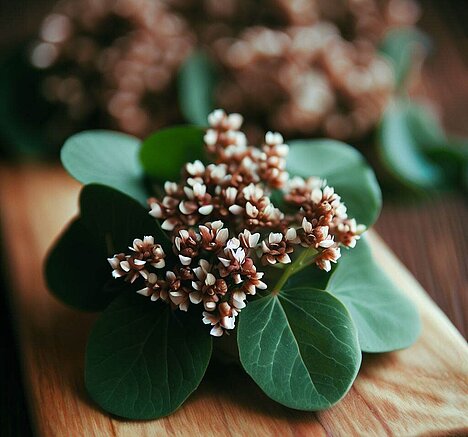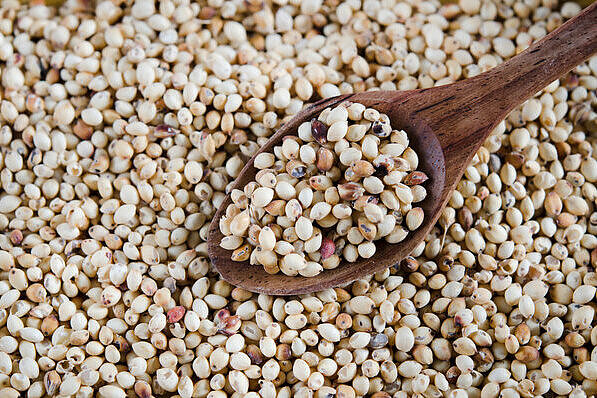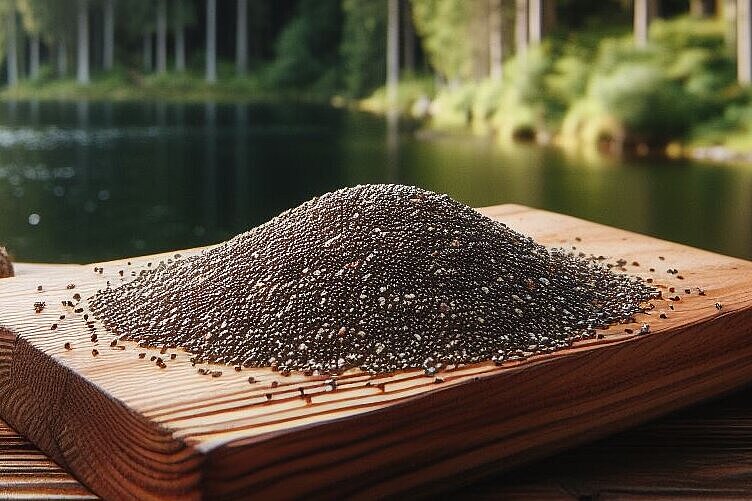Buckwheat herb

What is buckwheat herb?
Buckwheat herb is the green leaf mass of the buckwheat plant, which belongs to the knotweed family. Buckwheat is not a grain, but a so-called pseudo-cereal that can be used in a similar way to quinoa or amaranth. Buckwheat seeds are rich in protein, fiber and minerals and can be used as animal feed or flour.
Buckwheat usually grows as a weed in fields or meadows and has small white or pink flowers. It contains many valuable ingredients such as flavonoids, rutin, vitamins C and K as well as potassium, magnesium and iron. These can have a positive effect on human and animal health.
What are the benefits of buckwheat herb for dogs?
Buckwheat herb can help your dog in various ways. Firstly, it can be used as a food supplement to improve the supply of nutrients. Buckwheat herb is gluten-free and therefore also suitable for dogs with grain intolerance. It can be fed raw or cooked, e.g. as an ingredient in homemade dog food or as an addition to dry or wet food.
Buckwheat herb can also be used as a medicinal plant to alleviate various ailments. Buckwheat herb has an anti-inflammatory, blood-purifying and vaso-strengthening effect and can therefore help with skin problems, allergies, circulatory disorders or bleeding. It can be prepared as a tea and added to drinking water or applied externally as a poultice.
What are the disadvantages of buckwheat herb for dogs?
Buckwheat herb is generally well tolerated by dogs, but there are a few points to bear in mind. Firstly, you should make sure that you only use fresh and unsprayed buckwheat herb that is not contaminated with harmful substances. Secondly, you should adjust the amount of buckwheat herbs you give your dog. Too much buckwheat herb can lead to digestive problems such as flatulence or diarrhea or affect blood clotting.
You should also always consult your vet before giving your dog buckwheat herbs, especially if they are already taking medication or have a pre-existing medical condition. Buckwheat herb can, for example, strengthen or weaken the effect of blood-thinning or blood sugar-lowering medication.
Buckwheat herb is a versatile plant that can serve your dog both as a dietary supplement and as a medicinal plant. It contains many healthy ingredients that can strengthen the immune system and alleviate various ailments. However, you should take a few precautions to avoid side effects and not put your dog's health at risk.
Properties 7
Are you looking for other ingredients with a specific property?
Just click on them to find more.
If you notice any signs of hypersensitivity or poisoning in your dog, you should see your vet immediately. We are not a substitute for a vet, but we try to be as accurate as possible. Every dog reacts differently and we recommend you get a second opinion or consult your vet if in doubt.
Stay healthy and take good care of your four-legged friend!😊
Similar to Buckwheat herb
Amaranth is not a real grain, but belongs to the so-called pseudocereals, such as quinoa or buckwheat. This means that it does not contain gluten, which is often responsible for intolerances....
Quinoa is a plant from the foxtail family that grows in the Andes. The seeds of the plant are known as quinoa and are similar in shape and consistency to rice or couscous. Quinoa is gluten-free and...
Millet is a collective term for various types of grain from the sweet grass family. The best-known types of millet are panicle millet, foxtail millet, finger millet, pearl millet and sorghum millet....
Chia seeds have many positive properties for your dog's health. Here are some of them: They aid digestion by promoting intestinal flora and preventing constipation. They also bind water and swell...



